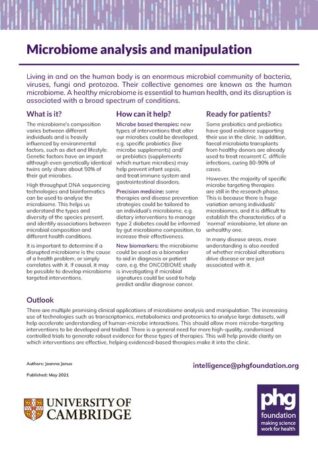Living in and on the human body is an enormous microbial community of bacteria, viruses, fungi and protozoa. Their collective genomes are known as the human microbiome. A healthy microbiome is essential to human health, and its disruption is associated with a broad spectrum of conditions.
What is it?
The microbiome’s composition varies between different individuals and is heavily influenced by environmental factors, such as diet and lifestyle. Genetic factors have an impact although even genetically identical twins only share about 50% of their gut microbes.
High throughout DNA sequencing technologies and bioinformatics can be used to analyse the microbiome. This helps us understand the types and diversity of the species present, and identify associations between microbial composition and different health conditions.
It is important to determine if a disrupted microbiome is the cause of a health problem, or simply correlates with it. If causal, it may be possible to develop microbiome targeted interventions.
How can it help?
Microbe based therapies: new types of interventions that alter our microbes could be developed, e.g. specific probiotics (live microbe supplements) and/or prebiotics (supplements which nurture microbes) may help prevent infant sepsis, and treat immune system and gastrointestinal disorders.
Precision medicine: some therapies and disease prevention strategies could be tailored to an individual’s microbiome, e.g. dietary interventions to manage type 2 diabetes could be informed by gut microbiome composition, to increase their effectiveness.
New biomarkers: the microbiome could be used as a biomarker to aid in diagnosis or patient care, e.g. the ONCOBIOME study is investigating if microbial signatures could be used to help predict and/or diagnose cancer.
Ready for patients?
Some probiotics and prebiotics have good evidence supporting their use in the clinic. In addition, faecal microbiota transplants from healthy donors are already used to treat recurrent C. difficile infections, curing 80-90% of cases. However, the majority of specific microbe targeting therapies are still in the research phase. This is because there is huge variation among individuals’ microbiomes, and it is difficult to establish the characteristics of a ‘normal’ microbiome, let alone an unhealthy one.
In many disease areas, more understanding is also needed of whether microbial alterations drive disease or are just associated with it.
Outlook
There are multiple promising clinical applications of microbiome analysis and manipulation. The increasing use of technologies such as transcriptomics, metabolomics and proteomics to analyse large datasets, will help accelerate understanding of human-microbe interactions. This should allow more microbe-targeting interventions to be developed and trialled.
There is a general need for more high-quality, randomised controlled trials to generate robust evidence for these types of therapies. This will help provide clarity on which interventions are effective, helping evidenced-based therapies make it into the clinic.

